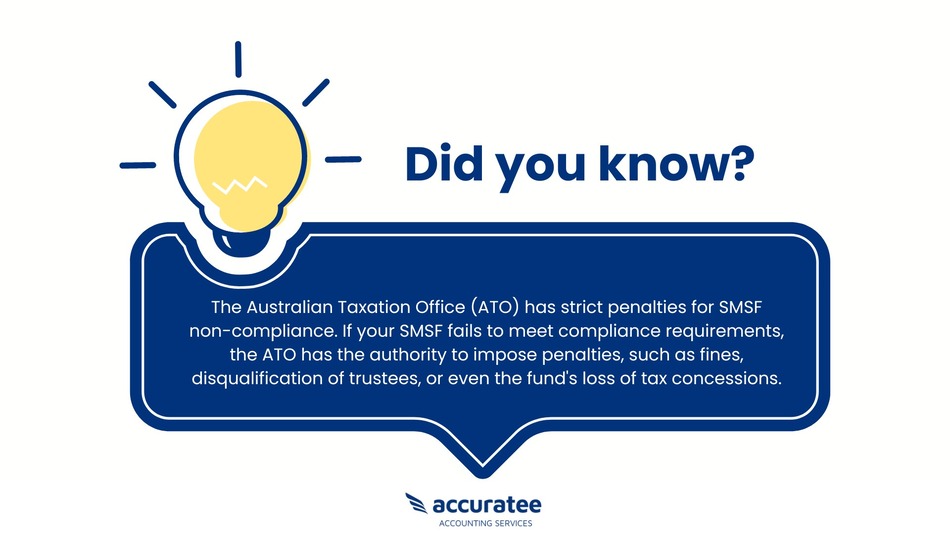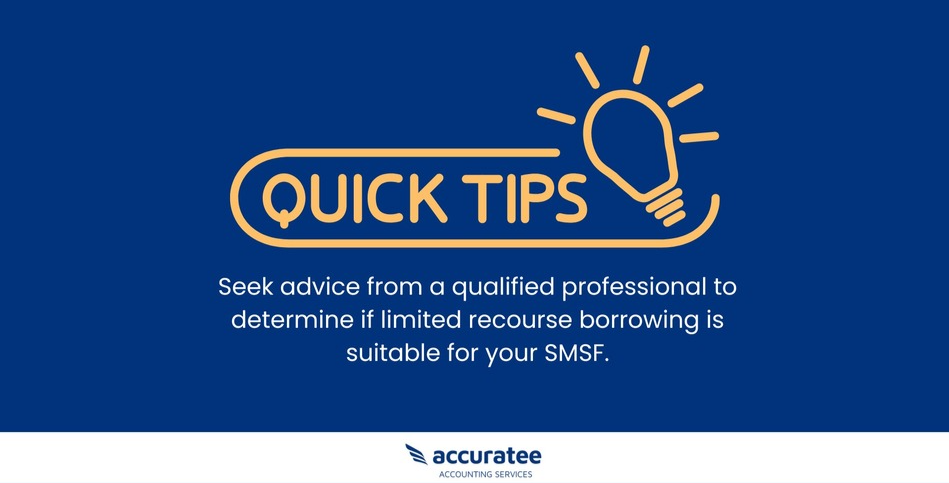SMSF Compliance and the ATO: What you need to know?
Introduction:
Having a self-managed super fund (SMSF) comes with many responsibilities, and one of the biggest is meeting your compliance obligations to the Australian Tax Office (ATO). It's imperative that SMSF trustees understand their obligations and keep up with any changes to tax regulations or methodologies.
This blog post will provide an in-depth look at SMSF compliance requirements, what you need to do to make sure you’re compliant, as well as ATO procedures for dealing with noncompliance. Read on to find out more about how keeping your SMSF compliant can help ensure its long term success.
Key takeaways
SMSF compliance refers to the rules and regulations that self-managed super funds must follow to operate legally and ethically.
Compliance requirements include appointing an approved SMSF auditor, accurate asset valuation, maintaining accurate financial records,and more.
It is crucial to avoid common mistakes and maintain proper adherence to regulations for SMSF compliance.
Outsourced SMSF accountants play an essential role in maintaining compliance and regulatory adherence.
SMSF Compliance - An overview
SMSF compliance refers to the rules and regulations that Self-Managed Superannuation Funds (SMSFs) must follow to ensure they are operating legally and ethically. As the name suggests, SMSFs are super funds managed by the members themselves rather than being managed by a third party.
To ensure compliance, SMSFs must adhere to a range of rules and regulations set out by the Australian Taxation Office (ATO). These include things like keeping accurate financial records, regularly reviewing investment strategies, and ensuring that fund assets are kept separate from the personal assets of members.
Failing to comply with these regulations can result in serious consequences, including hefty fines and potential legal action. That's why it's important for SMSF members to stay informed about their obligations and to seek professional advice if they are unsure about any aspect of their compliance responsibilities.
How are SMSFs regulated?
Self-Managed Superannuation Funds (SMSFs) are regulated by two key government agencies: the Australian Taxation Office (ATO) and the Australian Securities & Investments Commission (ASIC). The ATO is responsible for administering the relevant superannuation laws for SMSFs, while ASIC regulates financial services to protect consumers and manages SMSF auditor registrations. SMSF trustees must comply with the rules and regulations set by both agencies to ensure the fund operates lawfully and in the best interests of its members.
What are the five most essential SMSF Compliance requirements?
The most important SMSF compliance requirements includes the following:
-
Appointing an approved SMSF auditor:
In order to file your SMSF annual return (SAR), it is necessary to select an accredited SMSF auditor annually, with a minimum of 45 days prior to the filing deadline. Your chosen auditor must be registered with ASIC and possess an SMSF auditor number.
-
Asset valuation:
Your SMSF must keep accurate records of all assets, which must be independently valued on an annual basis. Valuations should take into consideration the current market value of the asset or its fair value at the time of purchase. Valuations are important to provide evidence that your fund is compliant with investment and borrowing rules.
-
Creating and following an investment strategy:
All SMSFs must have an investment strategy which outlines the fund's objectives and how it will invest its money. The strategy should be regularly reviewed to ensure that investments are performing as expected and to take into account any changes in the regulatory landscape.
-
Maintaining accurate financial records:
Your SMSF must keep accurate records of all transactions and activities, such as contributions, expenses and investments. This is important to ensure that the fund meets its reporting obligations and remains compliant with relevant laws. Check ATO website to get detailed information on SMSF record keeping requirements.
-
Complying with contribution rules:
All members of an SMSF must comply with the superannuation contribution caps and limits set by the ATO. This means that members cannot exceed the annual contribution cap of $25,000 or the lifetime cap of $500,000. If contributions are made in excess of these caps, penalties may be applied.
These five requirements form an essential part of ensuring your SMSF remains compliant with all applicable rules and regulations. It's important to ensure you are up-to-date with all relevant legislation in order to avoid any potential compliance issues.

What are the other compliance requirements SMSFs must adhere to?
In addition to the five most essential SMSF compliance requirements outlined above, there are several other rules and regulations that all SMSFs must comply with. These include:
-
Investment restrictions:
SMSFs must ensure that all investments are made within the fund’s trust deed, and in line with the law. This means investments cannot be made in illegal assets or to parties related to a trustee or member of the fund.
-
Estate planning:
SMSF trustees must ensure that estate planning provisions are in place to protect the fund’s assets after a death. This may include transferring assets to another family member or beneficiary of the deceased.
-
Limited recourse borrowing:
SMSFs may use limited recourse borrowing to purchase a single, such as real estate. However, the loan must be within specific parameters set by the ATO and all related expenses must be paid from the fund’s assets.
-
Retirement planning:
An SMSF trustee must ensure that all members are in a position to retire when they choose, and that the fund’s assets are managed in line with retirement planning objectives.
-
Tax compliance:
SMSFs must ensure that all members submit the correct tax returns each year, and lodge these on time. They must also keep accurate records of all income and expenses for taxation purposes.
-
Insurance:
SMSFs must establish an appropriate insurance policy to protect their assets and members of the fund. This may include life, disability or income protection insurance.
SMSFs must account for any capital gains or losses when assets are bought or sold. This means ensuring that all relevant records and calculations are kept up to date with the ATO.
-
Capital gains or losses
SMSFs must account for any capital gains or losses when assets are bought or sold. This means ensuring that all relevant records and calculations are kept up to date with the ATO.
-
Superannuation guarantee:
If an SMSF has employees, it is subject to superannuation guarantee contributions in accordance with Australian law. This means that the employer must make contributions to the fund for each employee on time and in full.
-
Winding up:
When an SMSF is wound up, the trustees must ensure that all assets are distributed correctly and according to the fund’s trust deed. The ATO must be notified of any changes or distributions.
-
Reporting:
SMSFs must submit a variety of reports to the ATO each year, such as annual returns, statutory financial statements and member contributions statements. These must all be completed within the specified timeframes.
-
Education:
SMSF trustees must stay up to date with any changes to the superannuation law so that they can ensure the fund remains compliant. It is also important for trustees to maintain a good understanding of their responsibilities and obligations as an SMSF trustee.
These are just some of the compliance requirements that all SMSFs must adhere to in order to remain compliant with Australian law. It is important for trustees to familiarize themselves with all of the rules and regulations that apply to their fund, and ensure that they are always meeting their obligations as an SMSF trustee.

Common mistakes to avoid when managing a self-managed superannuation fund (SMSF)
While SMSF compliance requirements can be complicated, there are a few common pitfalls that SMSF trustees should be aware of and avoid. This includes:
-
Unique bank account for SMSF:
You need a bank account in your fund’s name to manage the SMSF operations and to accept contributions, rollovers of super, and income from investments. The account must be separate from your trustees’ individual bank accounts and any related employers’ or advisers' bank accounts. This will protect your fund's assets and ensure super payments can be made to your SMSF.
-
Assets are not held in the name of the fund:
To ensure compliance, all assets must be held in your SMSF’s name and it is important that this information is kept up to date. This includes investments such as property, shares, or managed funds which should all have title deeds issued in the fund's name.
-
Assets not adequately insured:
It is important that any assets held by the SMSF are adequately insured against loss, damage or theft. For example, if you hold a property in your fund it should be insured for its market value.
-
Not updating the fund’s trust deed:
The SMSF must always operate in accordance with its trust deed and any changes to the trust deed need to be updated. This could include changes such as trustee roles, member details or investment strategy updates for example. Failing to update the trust deed can lead to non- compliance and possible penalties.
-
Failing to keep superannuation contributions records:
It is important that members of an SMSF maintain a record of all superannuation payments made into the fund, including employers’ contributions, salary sacrifice contributions and personal contributions such as co-contributions. This information is required for tax reporting purposes and should be kept for a minimum of five years.
-
Not getting the correct advice:
An SMSF is a complex structure and requires specific knowledge and expertise to ensure it remains compliant with superannuation laws. It is important to seek the right advice from qualified professionals when setting up, running or winding up your SMSF.
Expert Bookkeeping at Your Fingertips!
Tips to ensure your SMSF remains compliant:
- Ensure your SMSF is properly audited each financial year by a qualified and independent auditor.
- Lodge your annual return to the ATO on time, with all required documentation included.
- Follow the rules of ownership outlined in the trust deed, including who can be a trustee or member and who can contribute to your SMSF.
- Ensure investments are made within the investment strategy set out in the trust deed.
- Be aware of any regulatory changes that may affect your SMSF, and ensure you comply with those rules and regulations.
- Understand the borrowing arrangements for your SMSF, as some investments may require specialized loans or borrowing.
- Make sure your SMSF is adequately insured for any potential risks it may face.
- Ensure that the trustees of the SMSF are aware of their duties and obligations to the fund, including understanding all relevant laws and regulations they must adhere to in order to ensure compliance
- Keep accurate records of all investments made, as well as the contributions and distributions from the fund.
- Educate yourself on SMSF regulations and laws to ensure your knowledge on running it is up-to-date.
Maintaining SMSF Compliance: How CleanSlate's outsourced SMSF accountants play a crucial role?
Outsourced SMSF Accountants are crucial in ensuring that your SMSF follows the rules and regulations. They handle all the necessary paperwork, track fund transactions, provide advice on investments, monitor compliance, and deal with any audits or inquiries from the Taxation Office.
At CleanSlate, we understand that SMSF compliance can be complicated. But don't worry, our team of experts is here to help! We take care of all the legal obligations for your fund, from setting it up to ongoing maintenance like record keeping, tax returns, audits, and investment advice.
Our SMSF accountants are highly skilled professionals who stay updated on the changing regulations. You can trust us to handle your fund with care. With CleanSlate, you'll receive accurate and hassle-free advice, giving you peace of mind. So why stress about compliance when we've got you covered? Contact us today and let's tackle SMSF compliance together!


















